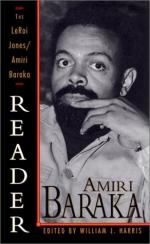|
This section contains 186 words (approx. 1 page at 300 words per page) |
Writer Amiri Baraka founded the 1960s Black Arts Movement, transforming white, liberal aesthetics into black nationalist poetics and politics. In 1967, he converted to Islam and changed his name from Leroi Jones to Amiri Baraka. His career can be divided in three stages: beatnik/bohemian (1957-1964), black nationalism (1965-1974), and Marxist revolutionary (1974-present). In 1960 he travelled to Cuba with a group of black artists. As a result, he grew disillusioned with the bohemian/beatnik atmosphere of Greenwich Village and began seeing the necessity of art as a political tool. The play Dutchman (1964) brought him into the public limelight, a one-act play about Clay, a young, black, educated man who, while riding the New York subway, is murdered by a beautiful white woman symbolizing white society. No American writer has been more committed to social justice than Amiri Baraka. He is dedicated to bringing the voices of black America into the fiber of his writings.
Further Reading:
Baraka, Amiri. The Autobiography of LeRoi Jones. Chicago, Lawrence Hill Books, 1997.
Harris, William, editor. The LeRoi Jones/Amiri Baraka Reader. New York, Thunder's Mouth Press, 1991.
|
This section contains 186 words (approx. 1 page at 300 words per page) |


